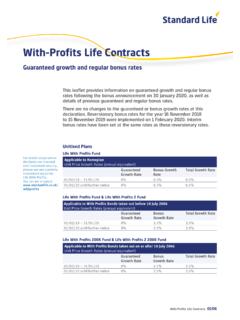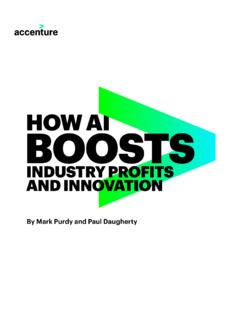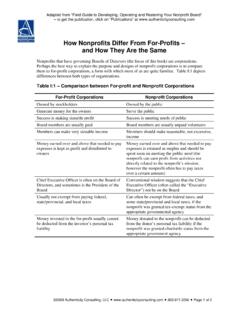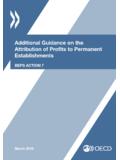Transcription of BEPS Action 7 Additional Guidance on Attribution of ...
1 Base Erosion and Profit Shifting (BEPS) Public Discussion Draft BEPS Action 7 Additional Guidance on Attribution of profits to permanent Establishments 22 June-15 September 2017 DISCUSSION DRAFT ON Additional Guidance ON THE Attribution OF profits TO permanent ESTABLISHMENTS The Report on Action 7 of the BEPS Action Plan (Preventing the Artificial Avoidance of permanent Establishment Status) mandated the development of Additional Guidance on how the rules of Article 7 of the OECD Model Tax Convention would apply to PEs resulting from the changes in the Report, in particular for PEs outside the financial sector.
2 The Report indicated that there is also a need to take account of the results of the work on other parts of the BEPS Action Plan dealing with transfer pricing, in particular the work related to intangibles, risk and capital. Importantly, the Report explicitly stated that the changes to Article 5 of the Model Tax Convention do not require substantive modifications to the existing rules and Guidance on the Attribution of profits to permanent establishments under Article 7 (see paragraph 19-20 of the Report). Under this mandate, the Committee on Fiscal Affairs released in July 2016 a discussion draft for public comments ( 2016 Discussion Draft ) and held a consultation with public commentators in October 2016.
3 The over 400 pages of comments submitted by commentators on the 2016 Discussion Draft highlighted the importance of developing Guidance that would be relevant for all countries, regardless of their approach to attributing profits to permanent establishments. Commentators also identified a number of issues in the draft Guidance which required further clarification, such as the impact of the revised Guidance on risk in Chapter I of the OECD Transfer Pricing Guidelines, and the impact of the analysis under Article 9 for purposes of Article 5. Considering the comments received as well as the positions of countries, the Committee on Fiscal Affairs recommended pursuing the work under a different approach to the one adopted in the 2016 Discussion Draft.
4 Accordingly, Working Party No. 6 has developed this new Discussion Draft, which replaces the 2016 Discussion Draft. This new Discussion Draft sets out high-level general principles outlined in paragraph 1-21 and 36-42 for the Attribution of profits to permanent establishments in the circumstances addressed by the Report on BEPS Action 7. Importantly, countries agree that these principles are relevant and applicable in attributing profits to permanent establishments. In particular, this Discussion Draft covers permanent establishments arising from Article 5(5), including examples of a commissionnaire structure for the sale of goods, an online advertising sales structure, and a procurement structure.
5 It also includes Additional Guidance related to permanent establishments created as a result of the changes to Article 5(4), and provides an example on the Attribution of profits to permanent establishments arising from the anti-fragmentation rule included in Article 5( ). It is important to note that, unlike the 2016 Discussion Draft, this Discussion Draft does not contain numerical examples; this is to avoid drawing conclusions from this Guidance on the level of profitability of the intermediary or the permanent establishment. The profits of the intermediary and the permanent establishments should be determined under the relevant articles in the applicable tax treaty ( Article 7 and, when applicable Article 9) based on the specific facts and circumstances of the case.
6 Interested parties are invited to send their comments on this discussion draft. Comments should be sent by 15 September at the latest by email to in Word format (in order to facilitate their distribution to government officials). They should be addressed to the Tax Treaties, Transfer Pricing and Financial Transactions Division, OECD/CTPA. Please note that comments are not sought on the 2016 Discussion Draft or on the changes to the PE definitions that have been agreed under Action 7 and which were published in the 2015 Final Report, "Preventing the Artificial Avoidance of permanent Establishment Status.
7 " Commentators should concentrate solely on the proposed Guidance in this Discussion Draft on the application of Article 7 to determine the Attribution of profits to PEs. The OECD intends to hold a public consultation on the Additional Guidance on the Attribution of profits to permanent establishments in November 2017 at the OECD Conference Centre in Paris, France. Registration details for the public consultation will be published on the OECD website later in September. Speakers and other participants at the public consultation will be selected from among those providing timely written comments on the discussion draft.
8 Please note that all comments on this discussion draft will be made publicly available. Comments submitted in the name of a collective grouping or coalition , or by any person submitting comments on behalf of another person or group of persons, should identify all enterprises or individuals who are members of that collective group, or the person(s) on whose behalf the commentator(s) are acting. DISCUSSION DRAFT ON Additional Guidance ON THE Attribution OF profits TO permanent ESTABLISHMENTS INTRODUCTION 1. Action 7 of the BEPS Action Plan mandated the development of changes to the definition of permanent establishment ( PE ) in Article 5 of the OECD Model Tax Convention ( MTC ) to prevent the artificial avoidance of PE status through the use of commissionnaire arrangements to avoid Article 5(5), and through reliance on the specific activity exemptions of Article 5(4).
9 It also mandated that the work should address related profit Attribution issues. The result was the 2015 Final Report on Action 7, Preventing the Artificial Avoidance of permanent Establishment Status" ( the Report on Action 7 ). 2. Paragraph 19 of the Report on Action 7 (at p. 45) states that the changes to Article 5 do not require substantive modifications to the existing rules and Guidance concerning the Attribution of profits to a PE under Article 7 [of the MTC], but .. there is a need for Additional Guidance on how the rules of Article 7 would apply to PEs resulting from the changes in this report.
10 There is also a need to take account of the results of the work on other parts of the BEPS Action Plan dealing with transfer pricing, in particular the work related to intangibles, risk and capital . CHANGES TO ARTICLE 5(5) AND 5(6) AND THE COMMENTARY 3. The Report on Action 7 provides for changes to be made to Article 5(5) and (6) of the MTC and the Commentary thereon. 4. Paragraph 9 of the Report on Action 7 (at p. 15) states: As a matter of policy, where the activities that an intermediary exercises in a country are intended to result in the regular conclusion of contracts to be performed by a foreign enterprise, that enterprise should be considered to have a sufficient taxable nexus in that country unless the intermediary is performing these activities in the course of an independent business.














